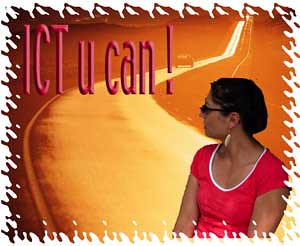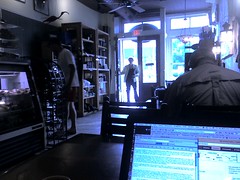Several days ago I installed an open source survey program on my web server, and fairly hastily set up a seven-question poll for teacher-users of Class Blogmeister. Over the next week or so, just over 50 teachers completed the survey. The results are reported below.
It is important to note that this was not a scientific study, and I am making no attempts to calculate any statistical likelihood of larger trends or behaviors. It’s been so long since I took a statistics course that I do not believe that I could if I wanted to. This report only seeks to describe how 50+ teachers answered the questions.
The data was desegregated by grade level, but there were so few respondents of K-2 and 9-12 classes, that I combined them to report on grades K-5 educators and grades 6-12.
- Here I am only looking for vague impressions about student motivation when they are blogging. The question could have been much better worded.

It’s worth noting that the two groups are pretty closely tied together, possibly indicating that more could have been learned from a better engineered question.
- These next questions are better, since I ask whether the teacher has actually seen evidence that students are learning better. Most often, today, we actually want to see that evidence in test scores. But I want to trust teachers to say, yes, I believe that my students are learning better, and I’ve seen clues that make me believe that.
- This question also seeks to determine if blogging is motivating to students writing, especially if they are writing within the context of some academic subject. What would be even more interesting might be to find out what qualities of blogging make students/people want to do it.
- Now we’re getting to the crux of the situation. Do students become better writers when they blog. I believe that I have. But do teachers believe that their students have — at least these 50 teachers.
- Most directly, blogging is about literacy, writing and reading and writing. However, how much of what I’m coming to call learning literacy is going on. Are students actually learning what they write about better, than when they are simply being taught it.
- This is one of the questions I was most interested in learning about. Who benefits the most from blogging in the classrooms.
- Finally, a fairly broad question that might be carried much more deeply in some future survey.

Again, the differences between the elementary and secondary respondents is not great. However, it is interesting to see that educators of younger children more often indicated that they Strongly Agreed with the statement.

Again, indications from the 50 respondents is that blogging is motivating, perhaps more so for elementary than secondary, but not significantly so, considering the small sampling.

Here the trend reverses, as secondary teachers are more likely to see evidence of writing improvement in their blogging students than elementary teachers. There are certainly lots of possible reasons that have more to do with who responded to this poll than the writing experiences of blogging students.

I suspect that there is little to be gained here except that teachers believe that their students are learning when they blog.

Once again, the sampling is too small and the conditions to chaotic to draw any real conclusions, but the secondary teachers who responded to this survey felt more strongly that lower achieving students gained more from blogging than did the average and above average performing students — this more so than elementary teachers.

Teachers seemed to all agree that there were side affect outcomes to classroom blogging, influences not directly attributed to the blogging experience.

 First of all, what are the three red markings to the right of “No Child Left Behind?” They probably represent something important and positive, but it looks to me like something scratched out — like a student wrote something down, and the teacher scratched it out. Probably just the cynical side of me breaking loose for a moment. You may not even get to read this 😉
First of all, what are the three red markings to the right of “No Child Left Behind?” They probably represent something important and positive, but it looks to me like something scratched out — like a student wrote something down, and the teacher scratched it out. Probably just the cynical side of me breaking loose for a moment. You may not even get to read this 😉
 I met
I met  I’m in one of my favorite places, an independently owned coffee shop. Brenda and I stopped and stayed at the Davidson Village Inn, in lovely Davidson, North Carolina. It’s my kind of college town, and my kind of coffee shop. Yesterday, we’d just enjoyed an old fashioned country church picnic in my home town. For those of you, for whom this old tradition is foreign, please indulge.
I’m in one of my favorite places, an independently owned coffee shop. Brenda and I stopped and stayed at the Davidson Village Inn, in lovely Davidson, North Carolina. It’s my kind of college town, and my kind of coffee shop. Yesterday, we’d just enjoyed an old fashioned country church picnic in my home town. For those of you, for whom this old tradition is foreign, please indulge.

 No, it doesn’t need to be plugged in to be an appropriate learning technology. I saw this, first hand, several months ago when I visited and worked with educators in New Zealand. I’ve already talked about the innovation that I saw in their vendor exhibit hall, but one that impressed me, perhaps, more than any other was
No, it doesn’t need to be plugged in to be an appropriate learning technology. I saw this, first hand, several months ago when I visited and worked with educators in New Zealand. I’ve already talked about the innovation that I saw in their vendor exhibit hall, but one that impressed me, perhaps, more than any other was  New York teacher and
New York teacher and